The first recipient of the coveted Ripple-IIITH Fellowship, IIITHian Sankarshan Damle is exploring the uncharted waters of blockchain and its limitless possibilities. We also look at what’s cooking at one of the first institutes to set-up a dedicated Center of Excellence in distributed ledger technology.
When soccer legend Messi moved to the French club PSG recently, his financial package included crypto tokens. We woke up to the reality of cryptocurrency claiming its spot in a brand new world. Blockchain and crypto are touted to be the driving force behind the fourth industrial revolution, after the steam engine, electricity and the microchip. Think of it as an alternative to Gold that has enormous value in the digital world and yet not duplicable.
Here’s the short version of the backstory. To enable Bitcoin, a type of cryptocurrency, Satoshi Nakamoto invented the first blockchain database, an incorruptible digital ledger that can confirm economic and other transactions without a central clearing authority and finds application in fund transfers, settling trades and a gamut of other applications.
The Ripple-IIIT Fellowship grant
The research fellowship was instituted by Ripple Labs Inc, a US industry leader in international payment protocols under the aegis of the University Blockchain Research Initiative in partnership with several leading universities like MIT, Berkeley, NUS, IIITH and IIT-B. Backed by IIITH’s Centre of Excellence, the Ripple fellowship awardee will actively study different aspects of distributed ledger technology in security, next-gen blockchains, game-theoretic issues, ML over blockchains, e-governance and auctions.
“Even as an undergrad student, Sankarshan had ticked all the boxes for the Fellowship”, states his mentor Prof. Sujit Gujar. With multiple courses in blockchain, he was already doing high quality research at IIITH. At the time of his interview, Sankarshan had publications aligned with blockchain, in three A-Star conferences (IJCAI and AAMAS), considered quite rare globally, especially for an undergraduate student.
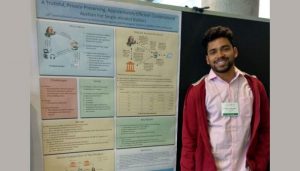
Who can apply for the Ripple-IIIT fellowship
Prof. Sujit Gujar, faculty at CoE specifies that the applicant’s profile should be slightly higher than the average and strictly aligned with blockchain related technology. Open to PhDs and post-doctoral applicants, the candidate should have research publications in A-Star forums and demonstrate strong potential for pursuing research. “We want to keep it very competitive because the grant is also quite competitive” observes Prof. Gujar.
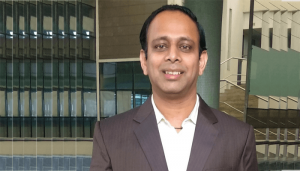
The ball ‘n’ chain of traditional Blockchain
One big bugbear with Bitcoin is its extremely slow transaction speed. “Where Visa clocks around 1000 transactions per second, Bitcoin can probably do three or four”, says Sankarshan, who is fresh out of his summer internship at Samsung. Cryptographers prefer blockchain for two main reasons. The first is that it allows you to make anonymous payments without the additional requirement for a centralized authority. Moreover, every detail is on the blockchain and available for verification by the user.
“One research area explores how blockchain as a platform can benefit India, with billions of potential users. We are developing theoretical aspects of design and good protocols that can be ratched up for large-scale applications. Even though our focus is research-oriented, the area itself is so interesting that it is possible to productise it or at least build a proof-of-concept product”, explains Prof. Gujar. Their research is investigating built-in protocols to protect privacy in the digital world through blockchains, machine learning and game theory.
The transparency of blockchain technology ensures trust in voting and its use in EVMs and auctions are a few applications that the team demonstrated at AAMAS 19, the premier conference for multi-agent systems. Their research paper in AAMAS 2020 discussed how blockchains could no longer guarantee fairness when scaled up. “We may walk together but I run faster” was their thought-provoking offering that won them the Best Poster Award. At ICBCI 2021, the team is scheduled to publish their latest research work in EVMs.
Sankarshan’s work in Blockchain and his IIITH experience
Says the cerebral youngster, “My primary motivation when I joined IIITH was its premier reputation and the fact that a good candidate attracted among the highest packages”. It all changed when the dual degree student joined the machine learning Lab in his third year under Prof. Sujit Gujar. “At a very young age I was given the opportunity to read papers, the freedom to explore and see how research happens at such top tier institutes”, says Sankarshan. “I initially started with game theory and as we moved along, we found that blockchain could be used as a handy tool for the larger community. By the fourth year, I was completely immersed in research and no longer cared about the highest package I could get”.
Sankarshan’s early research work with Prof. Gujar was in the domain of civic crowdfunding and in the innovative design of a mechanism to incentivize public contribution, with a refund scheme in place if the project did not materialize. His research internships under Prof. Dimitris Papadopoulos at Cybersecurity Laboratory, Hong Kong University of Science and Technology and under Prof. Boi Faltings at LIA, École Polytechnique Fédérale de Lausanne would go a long way in fine-tuning his focus. In 2020, he converted his B. Tech (with Honors) degree to a PhD.
The recipient of the Dean’s Academic Excellence Awards for two consecutive years (2017-19) and the Dean’s Research Award for his publications as an undergraduate student, the scholar was also awarded the Microsoft Research travel grant for a paper that he published in IJCAI, a premier conference at Macau.
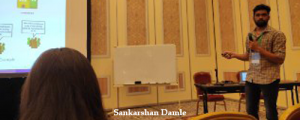
The man and his mission
Blockchain was actually something that happened by chance for Sankarshan. He was collaborating on his first paper with Boi Faltings on privacy preserving auctions and realised that incorporating blockchain into their current protocol would greatly benefit their work. He credits the blockchain course that Prof. Sujit Gujar taught at IIITH with being the game-changer for him. “Since 2017, Prof. Sujit has basically been instrumental in whatever I have achieved; from something as basic as the Papers I write, the topics to research and astute career guidance. My colleagues Moin Hussain Moti and Praphul Chandra have been a great support to me”, he says.
There is a unique culture of undergraduate research at IIITH, believes Sankarshan. For instance, at the start of the first year itself, one is exposed to top level programming, mathematics and IT courses. A 3rd year student is able to gain exposure to high quality research centers and faculty along with a slew of courses. “I remember Prof. P J Narayanan’s words during my orientation in 2015. He said that by the end of your first year, IIITH students are TCS-ready and by the end of second year, they will actually be Google-ready! It is this kind of extensive curriculum and rigor that really sets you up for the journey ahead, whether it is in academia or industry”, notes the scholar.
When Sankarshan joined his internship at EPFL on 1st March 2020, little would he realise that he would be scrambling back to India, three short weeks later, on the very last commercial flight to enter India, before the borders closed due to the pandemic. “However, we continued our collaboration with Prof. Boi on differential privacy”, remarks the youngster. Their work is slated to be published at the upcoming IEEE International Conference on Blockchain and Cryptocurrency (IEEE ICBC ’21).
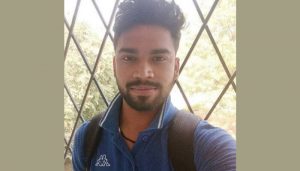
Into the mind of Sankarshan Damle
An introvert all his life, Sankarshan was happiest when he was immersed in the world of physics and math. His father, a government school lecturer would ensure that Sankarshan had the benefit of premier education at Christchurch, a CBSE school in Jabalpur, followed by the well-trodden path of JEE coaching institutions, that brought him to IIIT Hyderabad.
Volunteering is his way of giving back to the academic community. “It really boosts your research network and paves the way for collaborative work, which is really critical. You meet the people whose papers you have been following and get to share ideas with them”, he opines. Sankarshan follows the traditional 10–5 work schedule. Playing a round of tennis or channel surfing criminal shows on television are his de-stressing avenues. He plans to publish papers extensively to strengthen his profile and land a good post-doc after his Ph.D.
(https://mll.iiit.ac.in/blockchain/ripple-iiit-h-phd-fellowship/)
What is blockchain explained: https://www.ibm.com/in-en/topics/what-is-blockchain
https://www.euromoney.com/learning/blockchain-explained/what-is-blockchain
https://mll.iiit.ac.in/uncategorized/we-might-walk-together-but-i-run-faster/
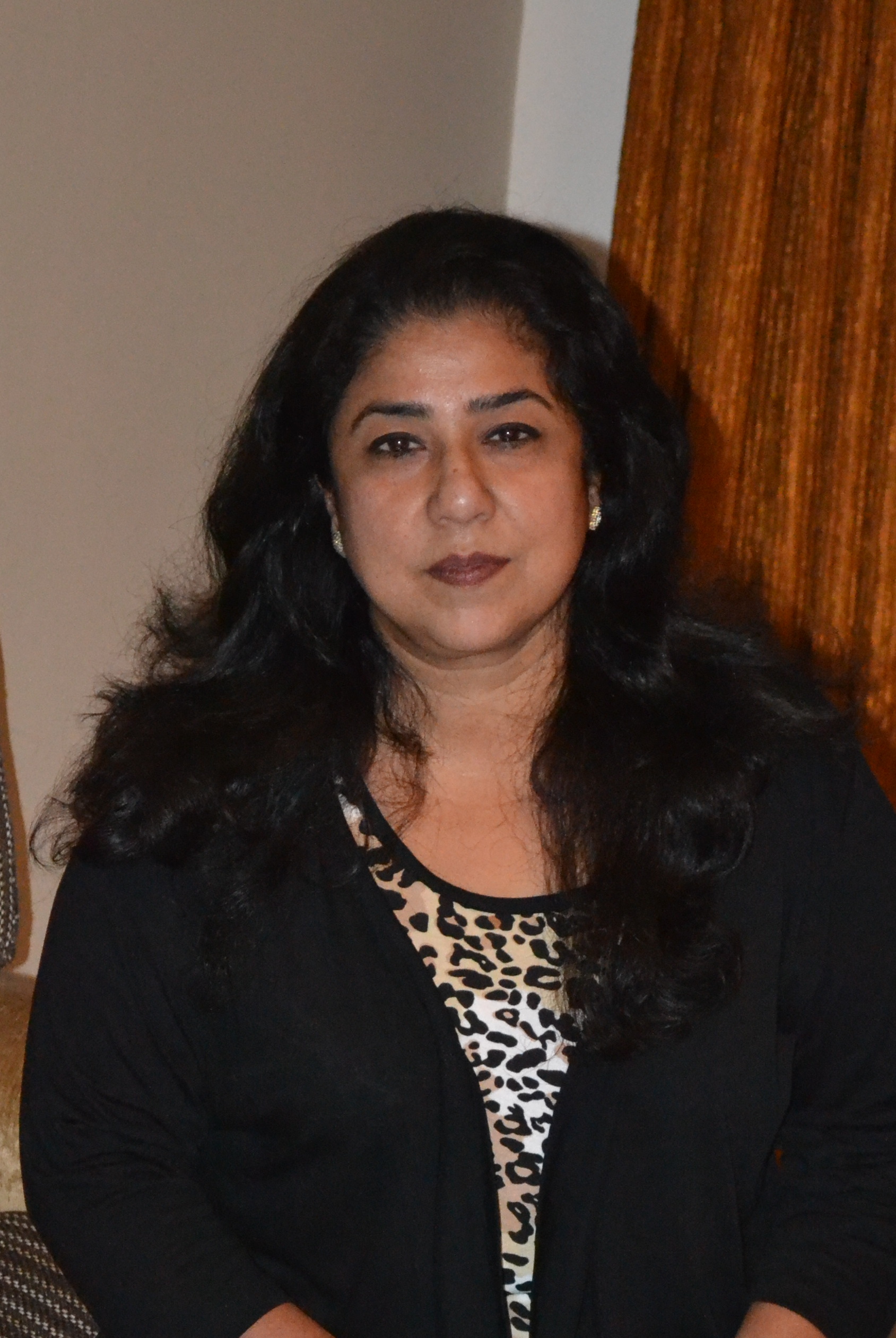
Deepa Shailendra is a freelance writer for interior design publications; an irreverent blogger, consultant editor and author of two coffee table books. A social entrepreneur who believes that we are the harbingers of the transformation and can bring the change to better our world.

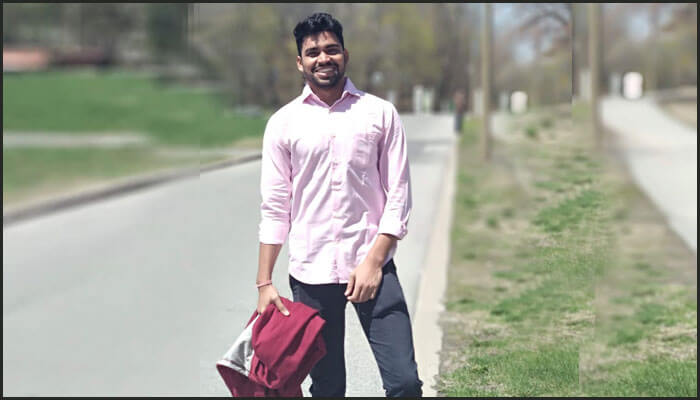
Next post